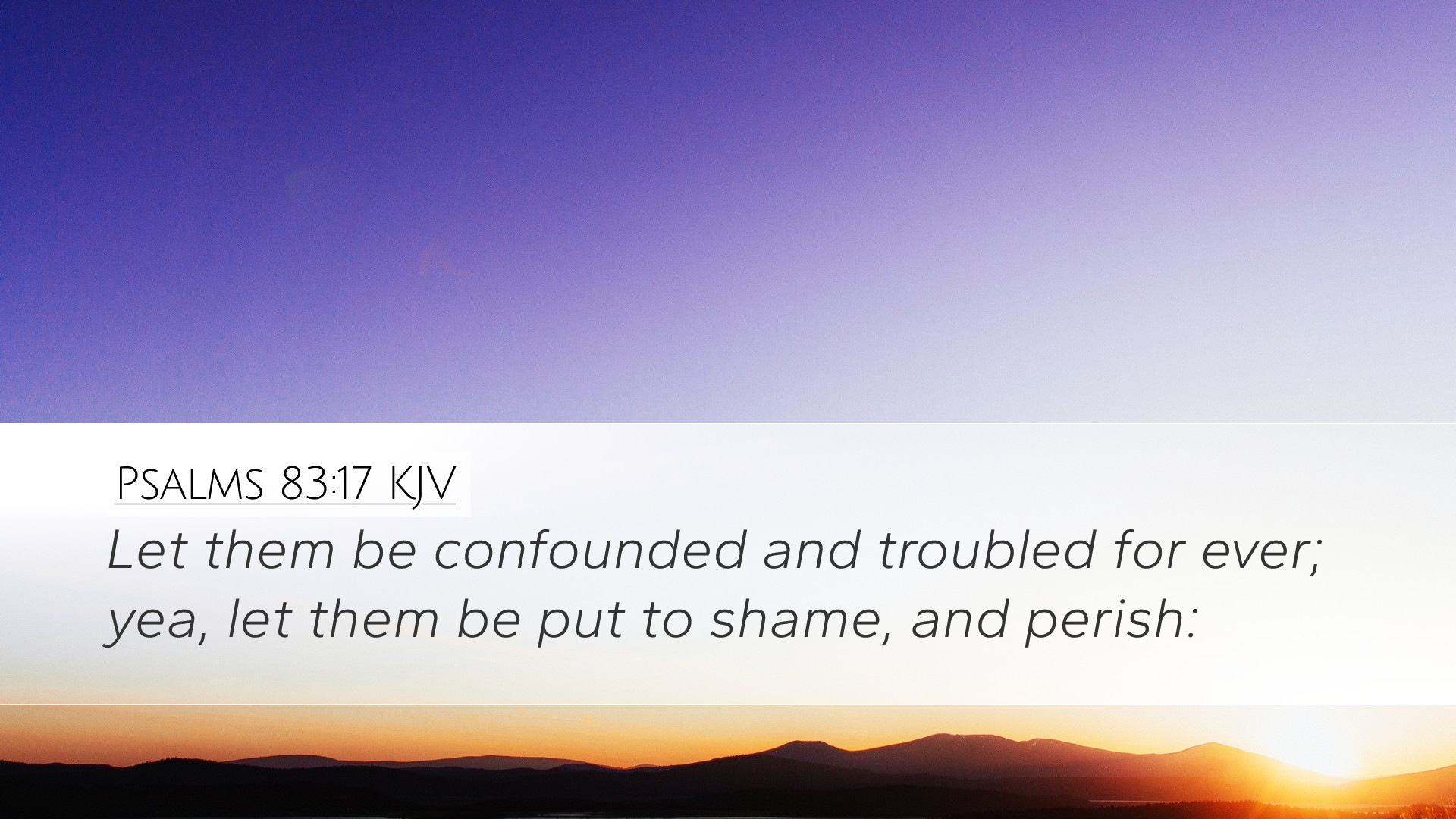Psalms 83:17 Commentary
Psalms 83:17 states, "Let them be confounded and troubled for ever; yea, let them be put to shame, and perish:" This verse culminates a plea for divine intervention against the enemies of Israel. As we explore this passage, we draw insights from notable public domain commentaries to provide a deeper understanding for pastors, students, theologians, and scholars.
Context and Overview
The 83rd Psalm is a communal lament that expresses the distress of the Israelites as they face a confederation of nations conspiring against them. The psalm vividly illustrates the gravity of the situation, invoking the imagery of these enemies conspiring to obliterate Israel’s identity as the people of God.
Verse Breakdown
- Confounded and Troubled: The request for confusion and trouble suggests a desire for God to thwart the plans of Israel's enemies. Matthew Henry notes that their schemes are so evil and futuristically directed against God’s people that they deserve to be left in disarray.
- Shame and Perish: The association of shame with their fate indicates that these nations, by their actions against Israel, bring disgrace upon themselves. Albert Barnes elaborates that their downfall is not merely a response to their aggression but an inevitable consequence of opposing God’s chosen.
Theological Insights
This verse raises important theological questions about the nature of God's justice and mercy. Adam Clarke suggests that the imprecation against the enemies serves a dual purpose—affirming God's sovereignty while also illustrating the seriousness of sin and rebellion against God.
Justice of God
In invoking these curses upon the enemies, the psalmist emphasizes God's justice. The psalm implores God to show His power by demonstrating that those who persecute and conspire against His people will ultimately fail. Matthew Henry points out that this reflects the assurance of God's impending judgment on wickedness.
The Nature of Enemies
- Union of Opponents: The psalmist speaks of a unified front against Israel. This serves to highlight the collective animosity that broader adversarial forces can have against the church and the faithful.
- Spiritual Meaning: The enemies symbolize spiritual adversaries present in every generation. These forces, though visible in physical terms, represent a more profound cosmic conflict against the ways of God. This understanding is vital for spiritual leaders and theologians in today's context.
The Response of God’s People
The request for divine intervention demonstrates the acute awareness of the psalmist of Israel's reliance on God’s power for deliverance. According to Albert Barnes, there is a recognition that human efforts are futile without divine assistance. The nature of prayer is thus emphasized as both an act of desperation and a profound trust in God’s protective nature. This speaks volumes to contemporary believers about the importance of seeking God in times of trouble.
Application for Believers
Pastors and leaders can draw from this passage the encouragement to foster a culture of reliance on prayer within their congregations, especially in dire times. Adam Clarke remarks that though believers may face overwhelming opposition, their focus should remain steadfast on God’s ability to intervene and protect. He suggests that cultivating an understanding of God’s justice bolsters faith and resilience.
Conclusion
In summary, Psalms 83:17 serves as a profound reminder of the enduring conflict between God's people and their adversaries. The combined insights from Matthew Henry, Albert Barnes, and Adam Clarke help illuminate the themes of divine justice and reliance on God's power. As such, this passage challenges believers to confront their circumstances with prayer and assurance that God’s justice will ultimately prevail.
This commentary not only aids in understanding the specific verse but also invites deeper contemplation on the nature of conflict, both spiritual and tangible, drawing the faithful toward a deeper reliance on God in an ever-challenging world.


